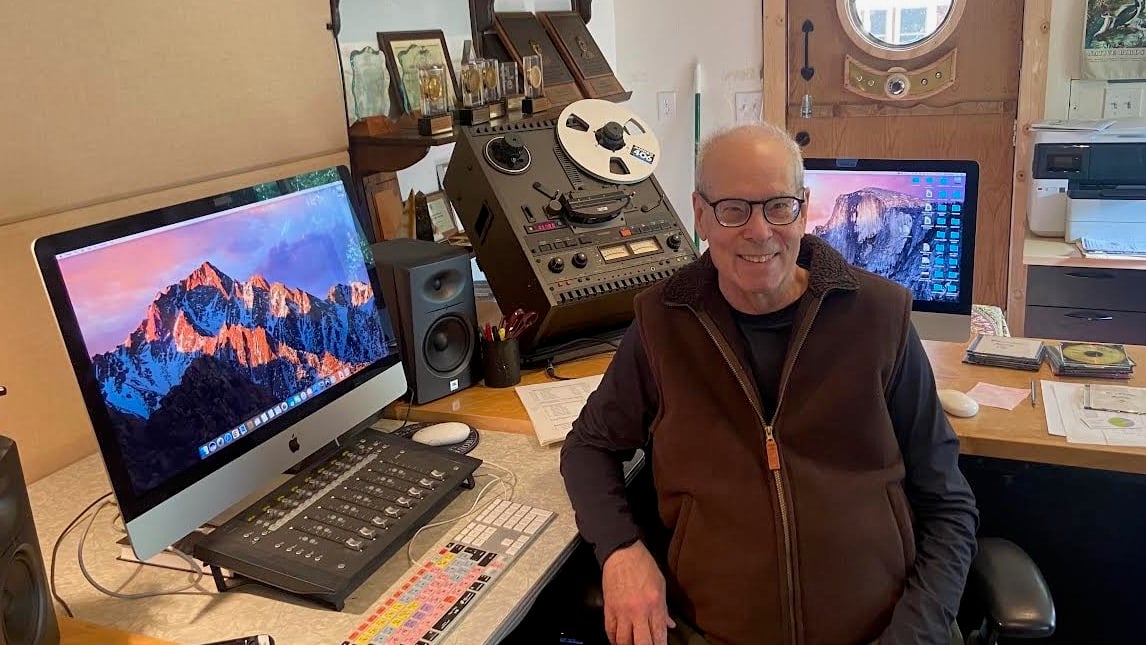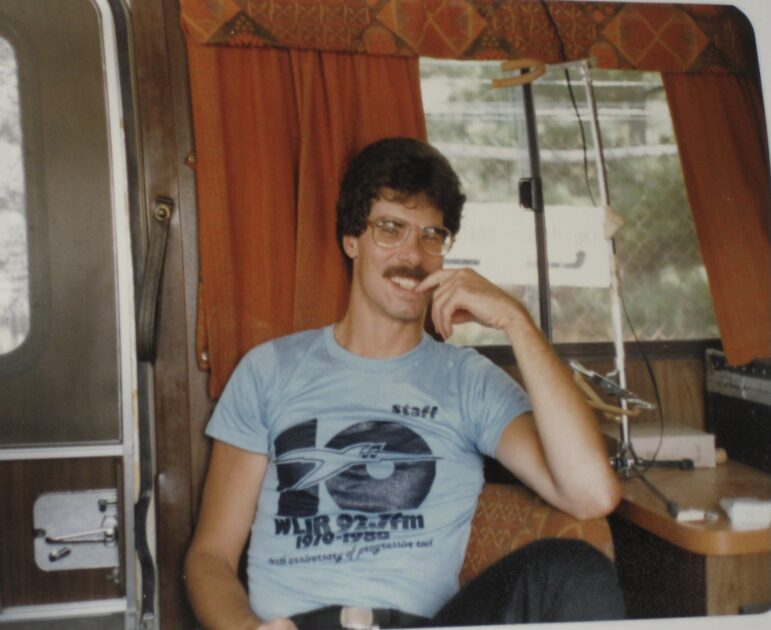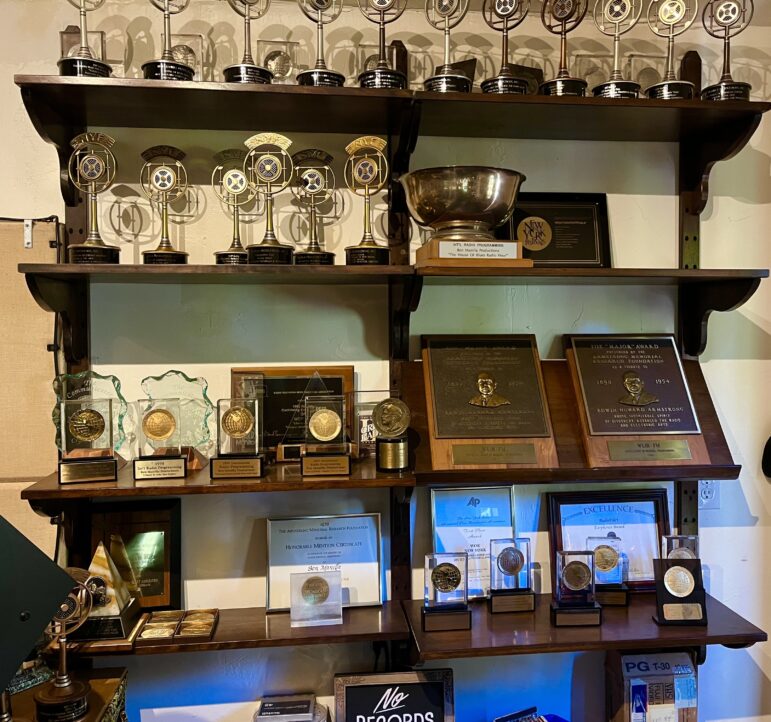Radio producer Ben Manilla dies at 71

Eliza Lape
Manilla in his home studio in Lagunitas, Calif.
Ben Manilla, a prolific, award-winning radio producer whose work spanned both commercial and public radio, died Sept. 30 at his home in Lagunitas, Calif. He was 71. His wife Eliza Lape said the cause was cancer.
Manilla’s documentaries and radio series won virtually every major radio award during his half-century career. He also taught audio at the University of California at Berkeley Graduate School of Journalism from 2007 to 2021.
“No one knew more about radio and audio programming and entertainment than Ben Manilla. No one loved the industry more than he did,” the actor Dan Ackroyd wrote in an email. “Ben’s passion for our mission, his even tempered, non-hysterical demeanor and quiet, dedicated professionalism made it an immense pleasure to work with him.”
For nearly 25 years, Ackroyd and Manilla collaborated on a syndicated blues radio show that was initially broadcast as The House of Blues Radio Hour but later morphed into Elwood’s BluesMobile. Ackroyd portrayed Elwood Blues in the Blues Brothers movie and musical act with John Belushi.
In June, the Library of Congress announced it will preserve all episodes of Ackroyd and Manilla’s shows along with 2,000 raw interviews with blues artists. Manilla raised close to $50,000 to begin the process of digitizing the recordings, but the Library of Congress has now taken over the project.
“This is the kind of music that I love,” Manilla said when the acquisition was announced. “It’s the roots of rock and roll. I am proud that we were able to pull it off and save all of this stuff so that future generations of documentarians, historians and fans alike will be able to hear these voices.”
Manilla’s 13-part blues series hosted by Keb’ Mo’ in 2003 was reportedly the most widely distributed special in the history of Public Radio International.
“The one thing Ben never did was wing it,” said Mike Henry, CEO of Paragon, a Colorado-based broadcast and digital media consulting firm. Henry recalled watching Manilla interview blues artists rehearsing at Radio City Music Hall for his PRI blues series, which piggybacked on a series of documentaries Martin Scorsese produced for PBS.
“He pulled such deep stories out of these blues guys,” said Henry. “His ability to ask a single question and get a story that an artist never or rarely told before required a lot of research. The stories that they told were just amazing.”
Manilla’s ‘News Blimps’
James Ben Manilla grew up in Manhattan and declined a wrestling scholarship to New York University, where he opted instead to concentrate on his theater major. He began his radio career at WNYU-FM, the college station.
After graduation, his first radio job came in 1975 at the Progressive Radio Network, a Bronx-based startup that produced three-minute news features with a countercultural take. At the height of its success, the company serviced several hundred rock radio stations that needed to meet an FCC mandate requiring a minimum amount of news and public affairs programming.

Manilla served as EP of the company. The densely produced, fast-paced News Blimps he produced were distributed via reel-to-reel audio tape and were mailed to stations during the pre-satellite and pre-internet era. Nearly a half-century later, the News Blimps — mixes of music, comedy, movie sound and news actualities — are still impressive, considering that they were made before the advent of digital audio workstations.
“We were very proud of the work. It was pretty unique,” said Jim Wynbrandt, an NYU classmate of Manilla who worked with him on News Blimps. “We were very excited to have an opportunity to present our news to like-minded audiences.”
While Manilla was still working at the Progressive Radio Network, he hosted a morning show and became production director at the influential Long Island rock station WLIR-FM. The station is credited with introducing listeners to punk and new wave music before its big city competitors in New York did. Before his move to the Bay Area of California, Manilla held a series of production jobs at the RKO Radio Networks, New York talk radio giant WOR and the commercial syndicator Radio Today.
Making stories sing
Manilla moved to San Francisco in 1991 and opened Ben Manilla Productions in the city’s financial district. Over the next 30 years he won Peabody, Armstrong, Edward R. Murrow and National Federation of Community Broadcasters awards for his radio work.
In 2006, Manilla started producing a series on records selected for the Library of Congress’ National Recording Registry. Initially, it aired on All Things Considered as “The Sounds of America,” then moved to Studio 360 and now runs on 1A. Manilla and his team won a Peabody Award for five episodes that aired on Studio 360 in 2012.
The segment is now produced by Jennie Cataldo, who started as a college intern at Ben Manilla Productions and became Manilla’s protégé. She now has her own production house, Accompany Studios.
“I always try to make stories sing,” Cataldo told Current. “Ben was the one who taught me that the best.”
“[He taught me that] the use of music always had to be intentional,” she said. “You couldn’t just score something with music that was just wallpaper. It had to be something that was being actively referenced. There had to be intention behind every piece of it.”
Another college intern at Ben Manilla Productions who became part of the staff was Peter Crimmins, who is now an arts and culture reporter at WHYY in Philadelphia.
“He was a really good guy to work for,” said Crimmins. “He would give chances to people who had no previous experience. He was sort of fearless that way. … He said, ‘I think you can do it. Go ahead and give it a shot.’”
One of Manilla’s hires was Devon Strolovitch, who came with a doctorate in linguistics but virtually no radio production experience other than hosting a blues show at Oberlin College’s student station. Strolovitch had heard that the Philosophy Talk radio program Manilla did for KALW needed a producer and was hired for the job. Strolovitch was wowed by the material Manilla had in his archive that could be used for bumper music and other production needs.
“The music he would come up with was show tunes you never heard of, ’80s bands you never heard of, that somehow related to the topic in a way you never thought of,” said Strolovitch.
When Manilla moved his office and studio to the Mission District, he gave away much of his huge record collection. Strolovitch inherited a good chunk of Manilla’s blues CDs, which he promptly put to use on his Fog City Blues show on KALW. But Manilla held on to his spoken-word record collection.
“He had all these presidential speeches, weird erotica and comedy,” Strolovitch recalled. “He had a massive library of DATs [digital audio tape cassettes] with clips … [organized] by topic. If you needed some funny Steve Martin clip or The Simpsons or whatever, he had a Filemaker database to search through. The resources were crazy. He had it all in his head and also on the shelf.”
Some of the music recordings went to Joel Selvin, who served as the rock critic for the San Francisco Chronicle for 36 years. Selvin praised Manilla for having what musicians like to call big ears and an equally big heart.
“When I think of Ben, I think of his enthusiasm and his unflagging good cheer,” said Selvin.
‘You only die once’
Shortly after the podcast era began, Manilla started teaching journalism students at UC Berkeley, often accompanied by his tiny dog Coco. He was praised by Edward Wasserman, the J-school’s dean, as a talented educator who laid the foundation for the school’s audio program.
“I had the pleasure of working with him directly in recording audio programs in the basement studio he helped create,” said Wasserman. “His coaching was confident and insistent but gentle, and it was impossible for me to protest when he demanded multiple takes. You know when you’re in the hands of a real pro, and Ben was that.”

Since 2017, Manilla’s health had been something of a roller coaster ride. Both he and his wife returned from their honeymoon in Hawaii with rat lungworm disease. Manilla was hospitalized for eight months. He was diagnosed with multiple myeloma cancer that same year.
Five years later, his cancer was in remission after T-cell therapy. But he emailed friends Sept. 17 that blood cancer had come on strong and that he would soon be in hospice. The email invited friends to a farewell party in October that he didn’t live to attend.
“I know this is late notice and highly unusual, but why not?” he wrote. “You only die once.”
Three days before his death, Steve North, a colleague from WLIR, visited Manilla at his home in Lagunitas and entered the small cabin adorned with a colorful totem pole that houses Manilla’s home studio. North took a picture of the wall of awards inside.
“We looked back over his whole career,” North said. “He was clearly proud of all he’d accomplished and was grateful he had managed to donate part of his vast archives to the Library of Congress. But I think his greatest achievement was the respect and love he received from his colleagues, and the sterling reputation he enjoyed after half a century in broadcasting.”
Manilla is survived by his wife, his son Griffin and his stepson Chase.
Correction: An earlier version of this article incorrectly said that Manilla and his team won a Peabody Award in 2012 for an episode of the series about records selected for the National Recording Registry that aired on Studio 360. They won for five episodes. An earlier version also misidentified Joel Selvin.







Jon,
Thank you for your obit of Ben. It brought back memories he’d shared of his early life, and reminded me of so many of the years we shared. He always spoke fondly of you, and whenever I hear a story or interview by Jon Kalish, I am all the more appreciative. Thank you for your work.
May we all be the richer for our years with Ben in our lives.
Saundra
Thank you so much for this article. I listened to Ben in the 70’s & early 80’s on WLIR. He had such enthusiasm for the music, very original production, but best of all Ben was humble & kind. Ben along with his good friend & fellow WLIR dj Ray White inspired & were a huge help in my radio career. They both were big believers in helping anyone who were interested in radio, production etc… I was lucky to know Ben (though we only spoke a few times) Thanks again. Brian Cosgrove WLIW-FM Long Island.